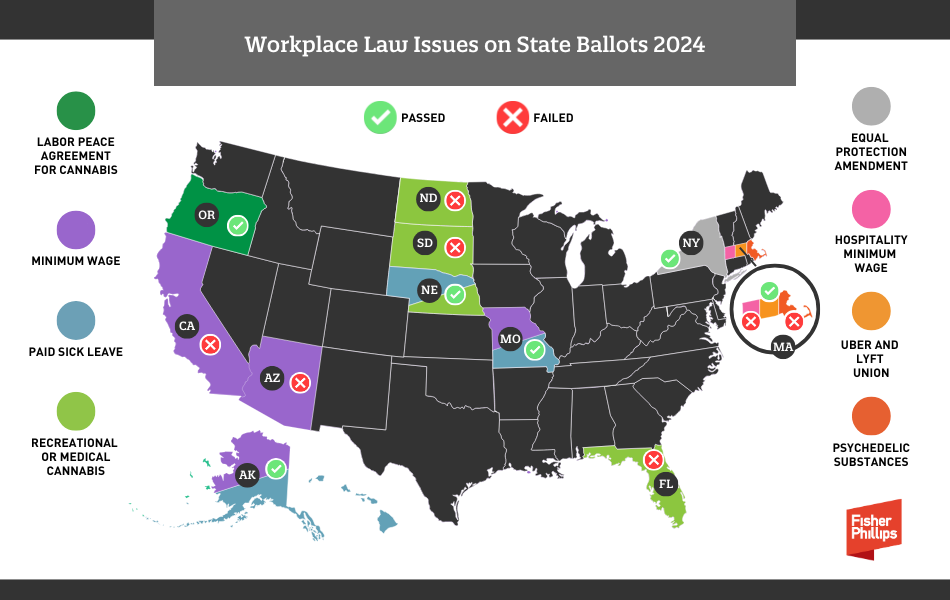From Cannabis to Minimum Wage and Beyond: How Did Workplace Law Issues on State Ballots Fare This Election Day?
Insights
11.07.24
Voters decided more than just who would be the next President and who would be in Congress this Election Day – they also voted on a slew of state ballot measures that aimed to change your workplace. Here’s a recap of the most significant labor and employment laws that were voted on this year, and make sure to visit our Post-Election Resource Center for Employers to review all our thought leadership and practical resources for employers.
Alaska
Voters will be deciding whether to raise the state minimum wage to $15/hour and to create a paid sick leave system for workers.
Result: The measure passed. The minimum wage will rise to:
- $13 on July 1, 2025;
- $14 on July 1, 2026, and
- $15 on July 1, 2027.
The minimum wage will then be annually adjusted for inflation and effective on January 1 on the following year.
Further, employees must accrue one hour of paid sick leave for every 30 hours worked starting July 1, 2025.
Arizona
Arizona’s current tipped wage is $3 less than the state’s standard minimum wage, and a campaign to end the tip credit altogether failed to make the ballot. Instead, voters will decide on a ballot initiative that would allow hospitality employers to pay a lower tipped minimum wage (25% less than the standard minimum wage) if workers earn at least $2 an hour more than the standard minimum wage when tips are factored in. Proponents say the initiative will support small businesses and their employees. Opponents say they will continue their efforts to end tipped wages in Arizona either through legislation or a ballot initiative in a future election. You can read more about how this issue has become a flashpoint for national politics here.
Result: The measure failed, losing by more than 75%.
California
California voters will get a chance to decide whether the state’s minimum wage should be raised to $18/hour – which would make it the highest in the nation.
Result: After several weeks of counting votes, Proposition 32 failed by a razor-thin margin – making California the first state to reject a minimum wage ballot increase at the polls in nearly three decades.
Florida
Businesses in the Sunshine State should start thinking about how a ballot initiative to legalize recreational cannabis could impact their workplace policies and practices. If 60% of voters agree this Election Day, Florida will join the growing ranks of states allowing recreational sales and use. While we anticipate that employers would still be able to enforce drug-free workplace policies if voters approve the initiative, you should stay tuned for developments as they unfold and review your policies to ensure they are up to date and compliant. Click here to read about the key things Florida employers need to know ahead of Election Day.
Result: The Constitutional amendment failed to reach the required 60% vote needed for passage, garnering close to 56% of the vote.
Massachusetts
There are three key ballot issues to track in Massachusetts:
- Voters will have their say on a ballot initiative to end the tip wage by 2029and require hospitality employers to pay the standard minimum wage regardless of how much workers earn in tipped wages. Industry groups like the National Restaurant Association are pushing back against this type of initiative, arguing that it would lead to higher prices and fewer jobs. You can read more about how this issue has become a flashpoint for national politics here.
- A ballot measure would allow Uber and Lyft drivers to form a union and engage in collective bargaining under state law. You can read all about a key settlement that could change the shape of this election here.
- Massachusetts voters will also determine whether the state will begin to provide regulated access to certain psychedelic substances. Click here to read more about psilocybin and other psychedelics, their legal status, and their potential impact on your workplace policies across the country.
Results:
- Voters rejected the hospitality measure by a large margin, approximately 64% to 36% with 93% of votes counted.
- The Uber/Lyft unionization measure passed.
- But voters rejected the psychedelic substances measure.
Missouri
Missouri voters will have a say about whether the state should raise the minimum wage to $15/hour by 2026, and whether it should create a paid sick leave requirement.
Result: Voters passed this measure, which you can read about in detail here.
Nebraska
Nebraska is another state that will see voters decide whether paid sick leave will become enshrined in state law, while also voting on whether to permit medicinal cannabis use.
Results: An overwhelming number of voters passed both measures, each receiving over 70% support.
New York
New York voters will have an opportunity to pass an Equal Protection Amendment that would be added to the state constitution. Currently, the state constitution prohibits discrimination based only on race, color, creed, and religion. If passed, the EPA would expand protections to include ethnicity, national origin, age, and disability, as well as sex, which would include sexual orientation, gender identity, gender expression, pregnancy, pregnancy outcomes, and reproductive healthcare and autonomy. While New York already has broad protections for these categories in state law, adding them to the constitution would create a higher level of judicial review and make it much more challenging for opponents of expanded rights to change the law at any future point.
Results: Voters easily passed this proposition by a 62% to 38% margin with approximately 95% of the vote counted.
North Dakota
A ballot measure in North Dakota will allow voters to decide whether recreational cannabis will be allowed in the state.
Result: Voters rejected the measure that would have legalized recreational cannabis, with those in favor casting only 47% of the vote.
Oregon
Oregon voters will decide whether cannabis businesses will need to enter into a signed labor peace agreement with a labor organization to obtain or renew the license from the Oregon Liquor and Cannabis Commission required to do business in the state. You can read more about this industry trend by clicking here.
Result: This measure passed with an approximate 55% to 45% vote count, which you can read about in detail here.
South Dakota
Just like their neighbors to the north, voters in South Dakota will decide whether recreational cannabis will be legalized in their state.
Result: And just like their neighbors to the north, South Dakota voters rejected this ballot measure.
Conclusion
We will continue to monitor developments related to all aspects of workplace law with a focus on the 2024 elections. Visit our Post-Election Resource Center for Employers to review all our thought leadership and practical resources. Make sure you are subscribed to Fisher Phillips’ Insight System to get the most up-to-date information. If you have questions, contact your Fisher Phillips attorney or the authors of this Insight.
Related People
-
- Benjamin M. Ebbink
- Partner
-
- Lisa A. McGlynn
- Partner
-
- Samantha J. Monsees
- Partner
-
- Melissa Camire
- Partner
-
- Joshua D. Nadreau
- Regional Managing Partner and Vice Chair, Labor Relations Group
-
- Alexander A. Wheatley
- Partner
Service Focus
- Counseling and Advice
- Employment Discrimination and Harassment
- Government Relations
- Labor Relations
- Wage and Hour






